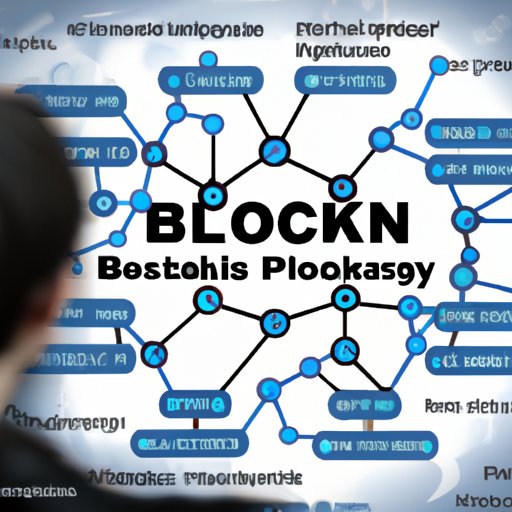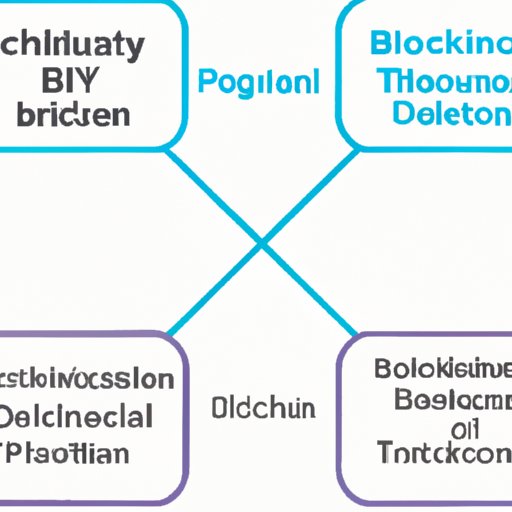Introduction
Blockchain technology is rapidly becoming one of the most important technologies of our time. It’s a decentralized, distributed digital ledger system that stores and records data across multiple computers, making it almost impossible to alter or modify. This makes blockchain technology incredibly secure and reliable, and it has the potential to revolutionize many industries.
In this article, we’ll explore the benefits of blockchain technology and look at some of the potential applications. We’ll also examine the security measures involved, and provide a guide for those interested in investing in blockchain technology.

Analyzing the Benefits of Blockchain Technology
Blockchain technology offers several key benefits compared to traditional systems. These include increased efficiency, improved security, greater transparency, and reduced costs.
Increased Efficiency
One of the main advantages of blockchain technology is that it can help reduce the time and cost associated with manual processes. Transactions are stored on the blockchain and are validated by multiple users, so there’s no need for third-party verification. This reduces the amount of time required for transactions, and eliminates the need for intermediary fees.
Improved Security
The decentralized nature of blockchain technology makes it incredibly secure. Data is stored on multiple computers, making it almost impossible for hackers to break into the system. Additionally, every transaction is recorded and validated by multiple users, making it virtually impossible to tamper with the data.
Greater Transparency
The information stored on the blockchain is transparent and accessible to everyone. This means that all transactions are visible, allowing users to verify the accuracy and validity of the data. This increases trust and accountability, as well as reducing the risk of fraud.
Reduced Costs
Since blockchain technology eliminates the need for intermediaries, it can help reduce the cost of transactions. This can be especially beneficial for businesses, as they no longer have to pay high fees to third-party providers.

Exploring the Potential Applications of Blockchain
Blockchain technology has the potential to revolutionize many industries, from finance to healthcare. Here are some of the potential applications of blockchain technology:
Smart Contracts
Smart contracts are self-executing contracts that use blockchain technology to store and transfer data. They allow parties to exchange money, property, or services without the need for a middleman. Smart contracts are secure and transparent, and they can be used in a variety of industries, such as real estate, banking, and insurance.
Supply Chain Management
Blockchain technology can be used to track the movement of goods throughout the supply chain. This allows businesses to monitor their products and ensure that they meet quality standards. It also helps reduce costs and eliminate counterfeiting.
Cryptocurrencies
Cryptocurrencies are digital currencies that use blockchain technology to securely store and transfer data. They are decentralized, meaning that no single entity controls them. Cryptocurrencies are becoming increasingly popular as an alternative to traditional currencies, and they can be used for online payments and investments.
Data Storage
Blockchain technology can be used to securely store and transfer data. Since the data is encrypted and stored on multiple computers, it is virtually impossible to hack or tamper with. This makes it ideal for storing sensitive personal and financial information.
Examining the Security of Blockchain Systems
Blockchain technology is incredibly secure, thanks to several key features. These include immutability, decentralization, and encryption.
Immutability
Once data is stored on the blockchain, it is almost impossible to alter or modify. Each block is linked to the previous one, making it difficult to change the data without leaving a trace. This makes it virtually impossible for hackers to gain access to the system.
Decentralization
Blockchain technology is decentralized, meaning that it is not controlled by any single entity. Instead, it is managed by a network of users, which increases the security of the system. This makes it difficult for hackers to gain access, as they would need to breach multiple computers in order to do so.
Encryption
Blockchain technology uses strong encryption to protect the data stored on the system. This ensures that only authorized users can access the data, and it makes it almost impossible for hackers to break into the system.
Investing in Blockchain: A Guide for Beginners
If you’re interested in investing in blockchain technology, there are a few things you should consider. Here are some tips for beginners:
Researching the Different Types of Projects
Before investing in a blockchain project, it’s important to research the different types of projects available. This will help you determine which type of project is best suited to your needs and objectives.
Understanding the Risks Involved
It’s important to understand the risks involved with investing in blockchain technology. Cryptocurrencies are highly volatile and can lose value quickly, so it’s important to understand the risks before investing.
Diversifying Your Investments
When investing in blockchain technology, it’s important to diversify your investments. Investing in a variety of projects will help spread your risk and increase the chances of success.

Comparing Blockchain to Other Technologies
Blockchain technology is often compared to other emerging technologies, such as Distributed Ledger Technology (DLT), Internet of Things (IoT), and Artificial Intelligence (AI). Here’s a brief overview of each:
Distributed Ledger Technology (DLT)
DLT is similar to blockchain technology, but it is more centralized. This means that data is stored on a single server, rather than on multiple computers. DLT is less secure than blockchain, but it is faster and more efficient.
Internet of Things (IoT)
The IoT refers to a network of connected devices, such as smart appliances, sensors, and wearables. These devices can collect and share data over the internet, which can then be used to automate processes and improve efficiency.
Artificial Intelligence (AI)
AI is a form of computer science that enables machines to learn and act like humans. AI can be used for tasks such as image recognition, natural language processing, and autonomous decision-making.
Conclusion
Blockchain technology is an incredibly powerful tool that can revolutionize many industries. Its key benefits include increased efficiency, improved security, greater transparency, and reduced costs. It also has the potential to be used for a variety of applications, from smart contracts to cryptocurrencies. Finally, it is incredibly secure, thanks to features such as immutability, decentralization, and encryption. Investing in blockchain technology can be a great way to take advantage of these benefits, but it’s important to understand the risks involved.
Overall, blockchain technology is an exciting and powerful technology that has the potential to revolutionize many industries. With its increasing popularity, it’s likely that we will see more and more applications of this technology in the near future.
(Note: Is this article not meeting your expectations? Do you have knowledge or insights to share? Unlock new opportunities and expand your reach by joining our authors team. Click Registration to join us and share your expertise with our readers.)
